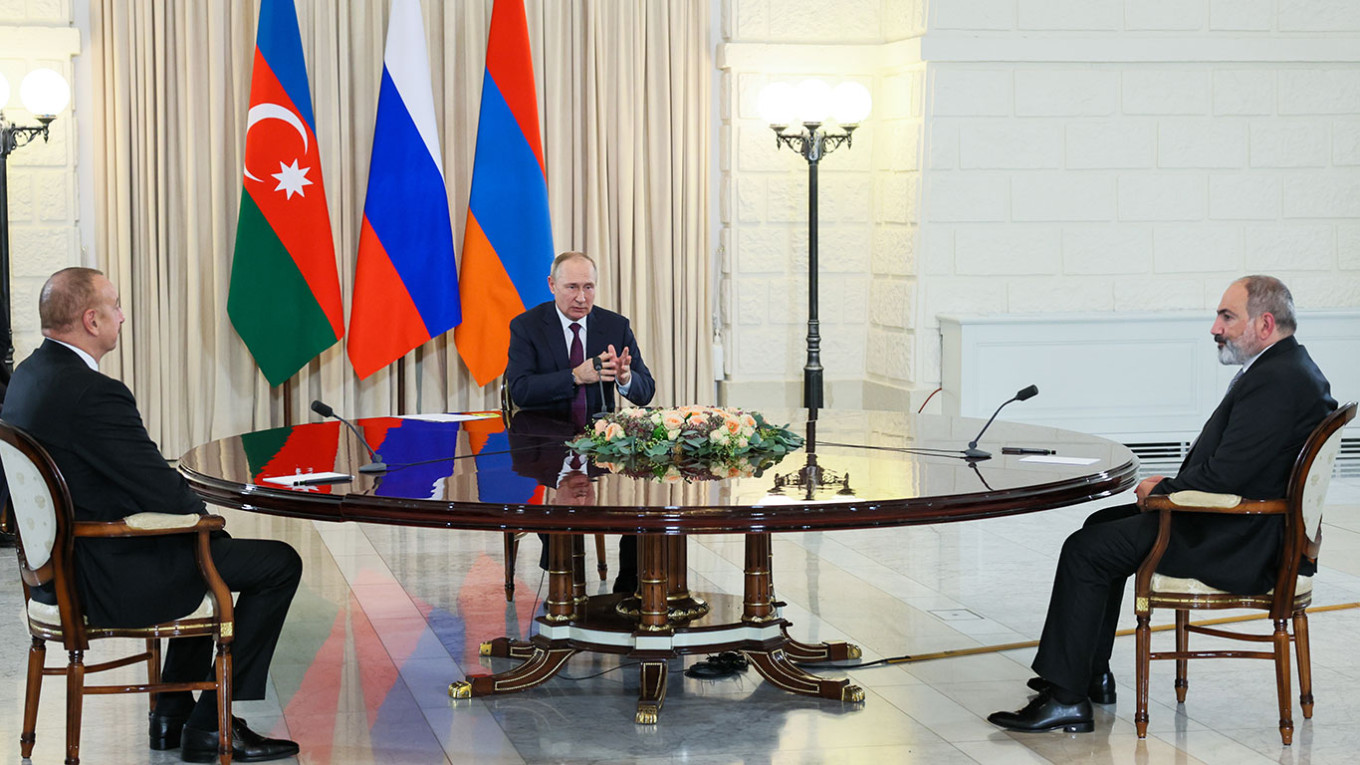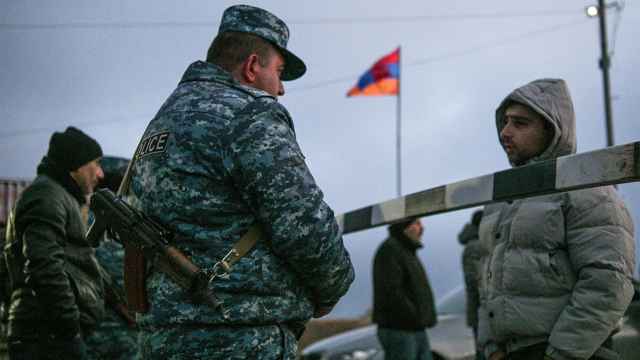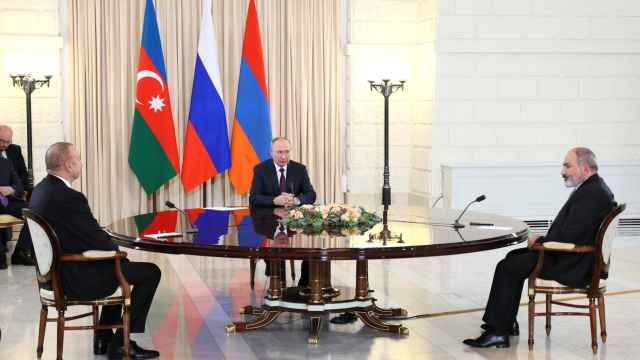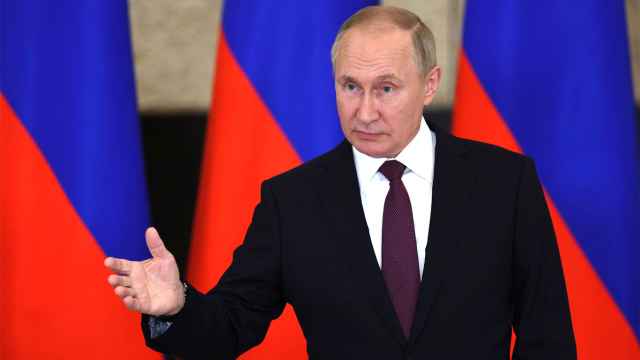Having spent much of the last 35 years in conflict with one another, the governments of Armenia and Azerbaijan now have a shared target of hostility: the Kremlin.
Recent days have seen the shaky Azerbaijan-Russia relationship engulfed in anger over the deaths of two Azerbaijani citizens in Russian police custody following the arrest of dozens of Azerbaijanis in the city of Yekaterinburg in connection with a 2001 cold-case murder.
Azerbaijani medical examiners have ruled that one of the deaths was caused by injuries inflicted in custody, while the other has been attributed to a heart attack due to post-traumatic shock.
The response from Baku was swift. On June 28, Azerbaijani officials summoned Russia’s chargé d'affaires over the incident and the next day canceled a high-level parliamentary visit to Moscow citing “violence against Azerbaijanis.” Azerbaijani security personnel then arrested the remaining employees of Moscow-funded Sputnik Azerbaijan on June 30, the Russian outlet that had been ordered to close several weeks prior.
Baku’s State Prosecutor announced on July 1 that it had opened an investigation into what a statement described as the “torture and murder with extreme cruelty of citizens of the Republic of Azerbaijan and persons of Azerbaijani origin.”
In what would appear to be a retaliatory show of force by Azerbaijan, groups of Russian nationals in Azerbaijan have been detained on accusations of drug trafficking — a charge that is routinely deployed in cases involving government critics or opponents. Videos released show the arrested Russians forced to walk and crouch in a humiliating manner. Detainees have appeared in court seemingly bearing the marks of beatings. Independent Russian media have identified several of the men as IT professionals who left Russia after the announcement of military mobilization in 2022.
Russia has in turn responded with more detentions, targeting the head of an Azerbaijan-Ural cultural organization.
Azerbaijan’s media space has also contributed to the anti-Russia campaign. On June 29, the government-run Azerbaijani Press Agency published an article titled “Same Russia, same scenario: Chauvinism and cruelty,” which connected the killings to the mistreatment of labor migrants and the invasion of Ukraine.
An opinion article on the pro-government Aze.media argued “the massacre orchestrated by Russian security forces in Yekaterinburg cannot be written off as an isolated incident. It is part of a broader pattern of [the] Kremlin’s anti-Azerbaijani policies,” going on to connect the incident to the accidental shooting down of a civilian Azerbaijani Airlines (AZAL) flight by Russian air-defense in December 2024.
Indeed, relations between Russia and Azerbaijan have been on edge following Russia’s refusal to promptly acknowledge its own fault in the disaster which killed 38 passengers and crew members. Russia’s lackluster response was greeted with condemnation by Azerbaijan’s strongman President Ilham Aliyev, who went on to cancel his attendance at Moscow’s all-important Victory Day parade in May at the last minute.
Next door to Azerbaijan, Armenia-Russia ties have been declining since 2020, when Russia failed to effectively intervene in that year’s war between Yerevan and Baku despite a longstanding alliance with Armenia. Further offensives by Azerbaijan in the following years only fuelled Yerevan’s pivot away from Russia, with recent years seeing more outreach by Armenia to Europe and the United States.
Meanwhile, in response, Russia ratcheted up media attacks on Armenia’s Prime Minister Nikol Pashinyan and his government, leading Armenian elites to accuse Russia of waging “hybrid warfare.”
Russia and Armenia’s government have squared off this June over the arrests of Russian-Armenian billionaire Samvel Karapetyan and high-profile clergymen over accusations of fomenting a coup plot. Russian Foreign Minister Sergey Lavrov publicly described the arrest of church officials as “unjustified attacks without any serious grounds," while Russian propagandist Margarita Simonyan went as far as to describe Pashinyan as the “Antichrist's anus.”
Armenia’s Foreign Minister responded by encouraging Lavrov to “refrain from interfering in Armenia’s domestic affairs and internal politics.” Armenian officials are now openly advocating for blocking Russian television broadcasts into Armenia.
Yet, core to understanding the current dynamic is that while Armenia operates from a position of vulnerability, Azerbaijan confronts Russia from a position of strength.
Since 2020, Azerbaijan has seen a series of events hinting at a rise to becoming a regional power. Chief among these has been the re-acquisition by force of Nagorno-Karabakh by in September 2023, allowing Aliyev to present a total victory to his population in the decades-long conflict with Armenia. Russian peacekeepers stationed in Nagorno-Karabakh did nothing to deter the Azerbaijani offensive that put an end to the long-running Armenian separatist project.
Yet it has not only been Baku’s victory against Armenia that has likely granted Aliyev greater confidence. In the last few years, Baku has dismantled what little independent media existed in the country, increased its role in global energy markets and trade routes and hosted COP 29 in 2024 in the face of accusations of rights abuses and ethnic cleansing. The years leading up to the airplane crash had seen working, even positive, relations between Baku and Moscow, with the Kremlin’s inaction over the Nagorno-Karabakh issue seemingly a recognition of Baku’s growing power.
Pashinyan’s government, on the other hand, faces increasing vulnerability at home. The government’s central promise to constituents since 2023, that through pragmatic negotiations and leaving behind nationalist claims, Armenia could achieve security and prosperity, has yet to bear fruit. There has yet to be a formal peace treaty with Azerbaijan as Baku pushes maximalist aims - demanding Armenia accept a transit corridor through its territory and modify its constitution.
In an early show of weakness in the run-up to the 2026 national elections, the governing party lost city-wide elections in Armenia’s second-largest city, Gyumri, in April.
Russia, additionally, holds a great deal more leverage over Armenia than Azerbaijan. With closed borders with both Azerbaijan and Turkey, Armenia remains reliant on Russia for trade and energy. Russia supplies around 85% of all gas to Armenia and the country’s energy infrastructure is largely controlled by Gazprom, giving the Kremlin more coercive cards to play against Yerevan should it see fit.
In contrast, Azerbaijan is more independent in terms of economy and energy security, with its all-important oil and gas sector profiting from Russia’s post-2022 isolation.
Ironically, as both Baku and Yerevan governments fall out with Moscow, there seems little prospect that it could force a reconciliation between the two. The seven months since the Azerbaijan airlines have seen notable contact with Ukrainian officials, perhaps in an effort to demonstrate Azerbaijan’s agency to Russia. But none of this has improved ties with Armenia.
While Russia’s influence in Armenia and Azerbaijan appears to be in decline, the circumstances of the two cases are distinct. In the Azerbaijani case, one can imagine possible off-ramps, such as Russia offering up police to be tried for the killings or a formal apology. Baku seems well-positioned to extract these kinds of symbolic concessions.
In the Armenian case, however, Russia appears to view Pashinyan as a hostile actor and appears interested in removing him. It has several potential mechanisms to pressure Yerevan at its disposal.
Time will tell the extent to which Moscow chooses to pursue either course of action.
A Message from The Moscow Times:
Dear readers,
We are facing unprecedented challenges. Russia's Prosecutor General's Office has designated The Moscow Times as an "undesirable" organization, criminalizing our work and putting our staff at risk of prosecution. This follows our earlier unjust labeling as a "foreign agent."
These actions are direct attempts to silence independent journalism in Russia. The authorities claim our work "discredits the decisions of the Russian leadership." We see things differently: we strive to provide accurate, unbiased reporting on Russia.
We, the journalists of The Moscow Times, refuse to be silenced. But to continue our work, we need your help.
Your support, no matter how small, makes a world of difference. If you can, please support us monthly starting from just $2. It's quick to set up, and every contribution makes a significant impact.
By supporting The Moscow Times, you're defending open, independent journalism in the face of repression. Thank you for standing with us.
Remind me later.








